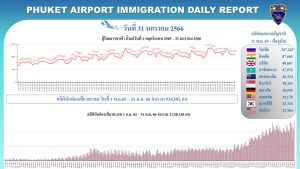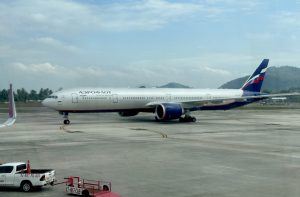by Tim Newton
Whilst Phuket's tourism tzars are delighted with the surge of arrivals into Phuket in recent months, the statistics reveal some crucial warnings for Phuket's immediate tourism future. And, despite all the back-patting from the local Tourism of Thailand office, Phuket's total tourist arrivals are still below 50% of average pre-pandemic levels.
Still, Phuket's tourism stakeholders have been lapping up the surge of mostly Russian arrivals as hotels, restaurants and seats in tour boats have been filling up over the past two months.
Let's check out the actual statistics.
Since the middle of December, Phuket has been receiving an average of 10-13,000 visitors a day, a figure that seems to be flatlining lately, according to the arrival statistics. But the vast majority of the arrivals since November are from one country – Russia. In Phuket's entire tourism history, there has never been such a concentration of arrivals from one particular country, not even close. Even with Chinese mass tourism in the years before the pandemic, the highest proportion of Chinese arrivals only reached 28%.
To amplify the issue, if you add up the arrivals from the next five countries in the list, from November 1 – January 31, you arrive at a similar figure of current Russian arrivals.

GRAPH: Phuket immigration arrivals
To be clear, there is no slight intended with these figures, it's just statistics. Many of the Russian arrivals are families, either on holidays escaping the Russian winter or trying to get some reprieve from the current political situation. There are some younger Russian men who admit to fleeing the new conscription laws, enacted by President Putin in early September last year, but they are not the majority.
267,245 Russian citizens have arrived in Phuket since the start of November last year. Of course there were Russians in the tourism mix for the decade before Covid-19 but never in the numbers, proportionally, we are seeing now. Indians, too, are a relatively new addition to the 'top 5' arrivals list but have become an important staple for Phuket's tourism mix since borders progressively opened with fewer restrictions last year.
If we were to remove the 267,245 Russian arrivals from the arrival's list, Phuket's tourism situation would be dire, in anyone's estimation. Simply put, the situation with the Russia/Ukraine war, and the open door policy to Russian arrivals by the Thai government, has saved Phuket's tourism recovery.

PHOTO: Aeroflot flight arriving in Phuket yesterday
But whilst the hoteliers and restaurant owners are happily welcoming the surge of visitors, there are others who don't see the current trend as either sustainable or a useful long-term solution, calling instead for a more diverse mix of nationalities to visit Thailand in the future.
There has also been an enormous surge in property purchases from Russian citizens in the past 3 months, pushing up the prices in the island's turbulent property market. Rental prices for motorbikes, cars and villas are skyrocketing. And the impact on the immigration offices and new visa applications is being widely reported.
Just last week, Ho Ren Yung, the senior vice-president at the Banyan Tree Group, was calling for more diversity in tourism promotion.
"Before the pandemic, one-third of the Banyan Tree's guests were Chinese. We are anticipating rising bookings in February as the Chinese tourists return. But we will certainly retain our guest diversity."
Phuket has been caught with its pants down before, hitching their tourism wagon to the Chinese travel express during the 2010s. The focus on attracting Chinese visitors became an acute problem following the 2018 sinking of the 'Phoenix' and the drowning by 47 Chinese tourists, including many children (the bad PR would have been a lot worse worldwide if not for the concurrent story of the Thai Cave Rescue which was in full swing at the time).
The negative publicity from the story, and the lack of action from Thai authorities at the time (including some insensitive comments from the deputy PM Prawit Wongsuwan), didn't travel well in Chinese social media, causing the tourism arrival figures in Phuket over the following year to plunge, for the first time in four decades. Tourism from China eventually recovered again but the lesson about reliance on one, single market had been learned.
Or had it?
Whilst market forces dictate, arrivals from some of the traditionally strong tourism markets, including many of the long haul feeder markets, are being hampered by both a lack and high price of flights, global economic challenges and a change in attitude towards Thai tourism. Whilst being the darling of world travel in the early 2000s, Thailand's 'bars, beaches and temples' tourism model is being overtaken by emerging tourism opportunities and a change in the post-Covid global travel demographics.
Phuket's tourism strength will always be providing a range of experiences to a diverse mix of nationalities and various budgets. The current focus on one nationality should be a concern for every person who derives a living from tourism in Phuket – the lessons of the past appear to be quickly forgotten.




Inga kommentarer:
Skicka en kommentar